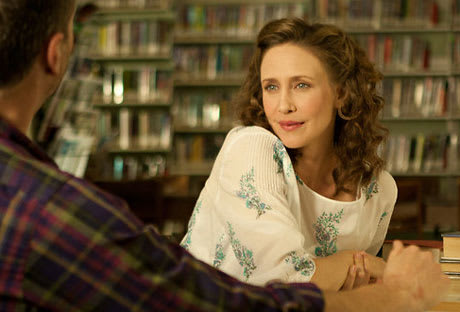The face of religion in America has changed drastically as the country moves into the 21st century. While the nation has become increasingly secular, religion has become a political battleground, instilling a sense of class war between the believers and non-believers. Those seeking spiritual fulfilment have the freedom of choice at their hands, but in this increasingly technocratic society, the moment of spiritual awakening often seems unreachable.
In Higher Ground, first-time director and star Vera Farmiga brings to life the trials and tribulations of one lost lamb. Based on the memoir This Dark World by Carolyn S. Briggs, Higher Ground is the story of a woman who comes of age in the late '60s, marries her first love and joins a Pentecostal church of religious hippies, whose seemingly progressive sermons about togetherness and holistic practice belie an inherent conservatism.
As Corrine (who goes from a whip-smart young bookworm to a young wife and mother seemingly overnight), Farmiga presents herself with the right amount of headstrong independence, yet the church is all she's ever known, and while her devotion to her husband and family waver, it's the crisis of faith that she has the most difficulty with.
Corrine is a woman lost in dogma wrapped inside the seemingly benign face of her sunshine church, and while it seems a little strange that all it takes is a friendly Irish mailman (Sean Mahon) to finally break her out of her funk, Farmiga guides her pet project with a benevolent hand.
The film is at its best early on, with Farmiga's younger sister (Taissa) playing a young Corinne, and later when Corrine interacts with her best friend, the free-spirit Annika (Dagmara Dominczyk). Farmiga and Dominczyk are so natural that one wishes Higher Ground would abandon its fairly rote storyline, by this point, to watch the two go off together. Higher Ground paints a detailed portrait of the often ignored or easily dismissed or demonized world of religion, bringing to the forefront the persuasiveness and easy comfort a spiritual community often brings to many people. Farmiga's light touch gives a distinctly human quality to Corrine's struggle.
Higher Ground will work best on those who have gone though a similar crisis of faith on their own. For those of us heathens who haven't, it acts as a compelling character study.
(Mongrel Media)In Higher Ground, first-time director and star Vera Farmiga brings to life the trials and tribulations of one lost lamb. Based on the memoir This Dark World by Carolyn S. Briggs, Higher Ground is the story of a woman who comes of age in the late '60s, marries her first love and joins a Pentecostal church of religious hippies, whose seemingly progressive sermons about togetherness and holistic practice belie an inherent conservatism.
As Corrine (who goes from a whip-smart young bookworm to a young wife and mother seemingly overnight), Farmiga presents herself with the right amount of headstrong independence, yet the church is all she's ever known, and while her devotion to her husband and family waver, it's the crisis of faith that she has the most difficulty with.
Corrine is a woman lost in dogma wrapped inside the seemingly benign face of her sunshine church, and while it seems a little strange that all it takes is a friendly Irish mailman (Sean Mahon) to finally break her out of her funk, Farmiga guides her pet project with a benevolent hand.
The film is at its best early on, with Farmiga's younger sister (Taissa) playing a young Corinne, and later when Corrine interacts with her best friend, the free-spirit Annika (Dagmara Dominczyk). Farmiga and Dominczyk are so natural that one wishes Higher Ground would abandon its fairly rote storyline, by this point, to watch the two go off together. Higher Ground paints a detailed portrait of the often ignored or easily dismissed or demonized world of religion, bringing to the forefront the persuasiveness and easy comfort a spiritual community often brings to many people. Farmiga's light touch gives a distinctly human quality to Corrine's struggle.
Higher Ground will work best on those who have gone though a similar crisis of faith on their own. For those of us heathens who haven't, it acts as a compelling character study.
